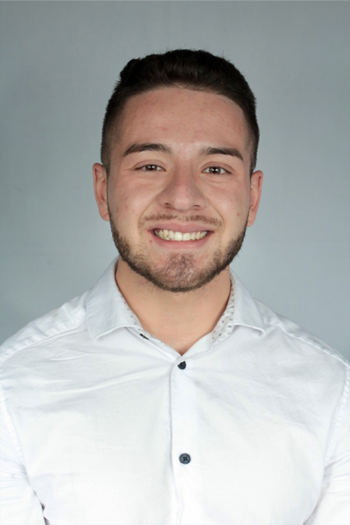
NJMS Helping Hands Grant Recipient Aims to Jump-Start a Mental Health Initiative
Sebastian Acevedo was always very attuned to the importance of emotional wellbeing. A first-generation immigrant from Colombia whose family lived through gang violence and lost relatives to it, he understood the effects of psychological trauma on people firsthand. So, when Acevedo, now a second-year medical student at Rutgers New Jersey Medical School NJMS, read about the youth mental health crisis overwhelming America, particularly the underserved communities, he wanted to help. Young people struggle with challenges ranging from negative self-images to traumatic childhood experiences to substance use. Yet, they often would not seek help, because speaking to the mental health professional can get one stigmatized. “One of my key concerns is that this crisis is disproportionately impacting communities of color,” Acevedo says—such as Newark. “I wanted to set up a series of workshops within the Newark community to destigmatize mental health and increase knowledge about common mental health issues.”
Acevedo applied for the Helping Hands Grant, a program run by the American Psychiatric Association that provides up to $5,000 to medical schools for mental health and substance use disorder initiatives, prioritizing minority communities. He was thrilled to be awarded $4,987.28 for his project. Partnering with the local Newark nonprofit, United Community Corporation, Acevedo has already developed a curriculum for 10 to 12 sessions that will educate participants about mental wellbeing and introduce them to the alternative forms of engagement. “We’ll talk about body dysmorphia, internalized negative images and the effects of trauma on the brain, while engaging youth in activities like painting, gardening and cooking.” Using the award funds, Acevedo already purchased art supplies, gardening tools and seeds for the hands-on sessions, and will also acquire meditation and yoga apps. “We want people to feel that if life is not working right now because of family or personal issues, they can express themselves in better ways than the maladaptive behaviors some youth in these communities struggle with.”
The grant imposes certain restrictions on funds use—for example it doesn’t allow to hire and pay instructors. However, the NJMS will help close the gap. “The medical school is allowing me to hire instructors to help facilitate some of these sessions,” Acevedo says. “I'm really thankful to both the American Psychiatric Association and the medical school for empowering this initiative.”
Commencing the week of March 20, the biweekly workshops will run through the end of April. However, Acevedo intends to continue even after the funding ends. “We have a school full of really enthusiastic medical students,” he says. “We can continue working with the nonprofit and incorporate some of these initiatives on a permanent basis. It’s really important for the community.”

